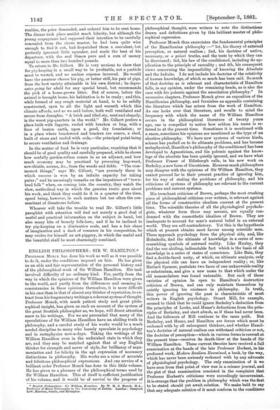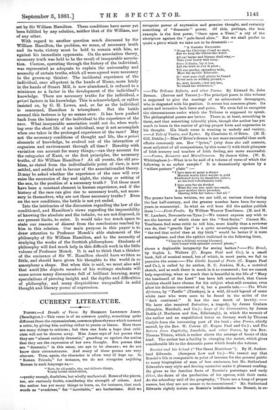ENGLISH PHILOSOPHERS: SIR W. HAMILTON.* PROFESSOR Morrcx has done his
work as well as it was possible to do it, under the conditions imposed on him. He has given us an able and fair representation of the personal history and of the philosophical work of Sir William Hamilton. His task involved difficulty of no ordinary kind. For, partly from the way in which the opinions of Sir William Hamilton were given to the world, and partly from the differences and seeming in- consistencies in these opinions themselves, it is more difficult in his case than in that of almost any thinker of reputation, to ex- tract from his fragmentary writings a coherent system of thought. Professor Monck, with much patient study and great philo- sophical insight, has given us such an account of the system of the great Scottish philosopher as, we hope, will direct attention anew to his writings. For we are persuaded that many of the speculations of Sir William Hamilton have an abiding truth in philosophy, and a careful study of his works would be a much needed discipline to many who loosely speculate in psychology and in metaphysics now-a-days. Taking the writings of Sir William Hamilton even in the unfinished state in which they are, and they may be matched against that of any English thinker for strength and nerve of style, for brilliancy of argu- mentation and for felicity in the apt expression of necessary distinctions in philosophy. His works are a mine of accurate and felicitous philosophical expressions. And one service of a brilliant order Professor Monck has done in this little volume. He has given us a glossary of the philosophical terms used by Sir William Hamilton. This of itself is sufficient justification of his volume, and it would be of service to the progress of • English Philosophers: Sir William Hamilton. By W. H. S. Mona, MA., Professor of Moral Philosophy in the University of Dublin. Loud= Sampson Low, Marston, Searle, and Rivington.
philosophical thought, were writers to note the distinctions drawn and definitions given by this brilliant master of philo- sophical expression.
Professor Mon& thus enunciates the fundamental principles of the Hamiltonian philosophy :—" 1st, his theory of. external perception, or natural realism ; 2nd, his doctrine of native, necessary, or a priori truths, and the tests by which they can be discovered ; 3rd, his law of the conditioned, including its ap- plication to the principle of causality ; and 4th, his consequent views concerning the impossibility of knowing the Absolute and the Infinite. I do not include his doctrine of the relativity of human knowledge, of which so much has been said. So much of that doctrine as is relevant and characteristic of Hamilton falls, in my opinion, under the remaining heads, as is also the case with his polemic against the association philosophy." In successive chapters, Professor Monck gives an exposition of the Hamiltonian philosophy, and furnishes an appendix containing the literature which has arisen from the work of Hamilton. As one looks over that literature, and recalls to mind the frequency with which the name of Sir William Hamilton occurs in the philosophical literature of twenty years ago, one is compelled to notice how seldom his name is re- ferred to at the present time. Sometimes it is mentioned with a sneer, sometimes his opinions are mentioned as the type of an abortive philosophy. We have new systems of various kinds, science has pushed on to its ultimate problems, and has become metaphysical, Hamilton's philosophy of the conditioned has been developed to Agnosticism, and his polemic against the know- lege of the absolute has been quietly ignored, and we have what Professor Fraser of Edinburgh calls, in his new work on Berkeley, a new form of Gnosticism. However much philosophers may disagree with the opinions of Sir William Hamilton, they cannot proceed far in their present practice of ignoring him, for his way of stating the problems of philosophy, and his criticisms of systems of philosophy are relevant to the current problems and current systems.
His trenchant criticism of Brown, perhaps the most crushing piece of philosophical criticism ever written, is relevant against all the forms of constructive idealism current at the present time. The scientific theories of all the physiological psycholo- gists, whatever form these may assume, are equally con- demned with the cosmothetic idealism of Brown. They are inadequate to account for man's natural belief, in an external world. They are self-contradictory. Yet this is the hypothesis which at present obtains most favour among scientific men. These approach psychology from the physical side, and, like Helmholtz, find the ultimate of knowledge in a series of non- resembling symbols of outward reality. Like Huxley, they find the one abiding, indissoluble fact which is the basis of all knowledge in a series of states of conscience. Like Bain, they find a double-faced unity, of which, on ultimate analysis, only the physical side can have an independent reality.; or, like Herbert Spencer, postulate two faces of one unknowable reality or substratum, and give a new name to that which under the old nomenclature was found untenable. But each of these varieties of opinion lie open to Hamilton's destructive criticism of Brown, and can only maintain themselves by quietly ignoring his existence in philosophy. In truth, this power of ignoring the past is characteristic of most writers in English psychology. Stuart Mill, for example, seemed to think that he could ignore Berkeley's deduction from the principles of Locke, and Hume's deductions from the prin- ciples of Berkeley, and start afresh, as if these had never been. And the followers of Mill continue in the same path. But Berkeley, and Hume, and Hamilton are forces which must be reckoned with by all subsequent thinkers, and whether Hamil- ton's doctrine of natural realism can withstand criticism or not, the doctrine of perception—which in various forms is current at the present time—receives its death-blow at the hands of Sir William Hamilton. These current theories have received a full examination at the hands of the late Professor Herbert, in his profound work, Modern Realism Examined, a book, by the way, which has never been seriously reckoned with by any advocate of physiological psychology. The only examination of it we have seen from that point of view was in a science journal, and the gist of that examination consisted in the complaint that Professor Herbert's criticisms were exceedingly inconvenient. It is strange that the problem in philosophy which was the first to be stated should yet await solution. We make bold to say that any adequate solution of it must conform to the conditions
set by Sir William Hamilton. These conditions have never yet been fulfilled by any solution, neither that of Sir William, nor of any other.
With regard to another question much discussed by Sir William Hamilton, the problem, we mean, of necessary truth and its tests, victory must be held to remain with him, as against his immediate opponents. On the association theory, necessary truth was held to be the result of inseparable associa- tion. Custom, operating through the history of the individual, was represented as adequate to explain the universality and necessity of certain truths, which all were agreed were necessary in the grown-up thinker. The incidental experience of the individual, once all-potent in the hands of Hume, more lately in the hands of Stuart Mill, is now abandoned, is reduced to a minimum as a factor in the development of the individual's knowledge. There are necessary truths for the individual, a priori factors in his knowledge. This is acknowledged, or rather insisted on, by G-. H. Lewes, and, so , far as the individual is concerned, Hamilton is triumphant. But the battle around this fastness is by no means over. It has been pushed back from the history of the individual to the experience of the race. What inseparable association could not do, when work- ing over the short life of an individual, may it not accomplish when one takes in the prolonged experience of the race ? May not the necessary conditions of thought and life, the a priori elements of knowledge, be evolved out of the interaction of organism and environment through all time? Heredity with variation can account for many things,—can they account for the categories of Kant; or the first principles, the necessary truths, of Sir William Hamilton ? At all events, the old pro- blem, as stated from the individualistic point of view, is now settled, and settled not in favour of the associationalist theory. It may be asked whether the experience of the race will ever raise the succession of day and night, the rising or setting of the sun, to the position of a necessary truth ? Yet these must have been a constant element in human experience, and if the history of the race can give rise to necessary truth, not neces- sary in themselves, why are not these necessary truths ? Even on the new conditions, the battle is not yet ended.
Into the intricacies of the discussion regarding the law of the conditioned, and Hamilton's views regarding the impossibility of knowing the absolute and the infinite, we are not disposed, in our present limits, to enter. It would take too much space to state our reasons of dissent from the conclusions reached by him in this relation. Our main purpose in this paper is to draw attention to Professor Mouck's able statement of the philosophy of Sir William Hamilton, and to the necessity of studying the works of the Scottish philosophers. Students of philosophy will find mach help in this difficult work in the little volume of Professor Monck. It is sad to think that a thinker of the eminence of Sir W. Hamilton should have written so little, and should have given his thoughts to the world in so amorphous a shape. But when this is said, we must also add that amid ithe disjecta membra of his writings students will come across many discussions full of brilliant learning, many speculations of piercing insight and the depths and difficulties of philosophy, and many disquisitions unequalled in solid thought and literary power of expression.



































 Previous page
Previous page